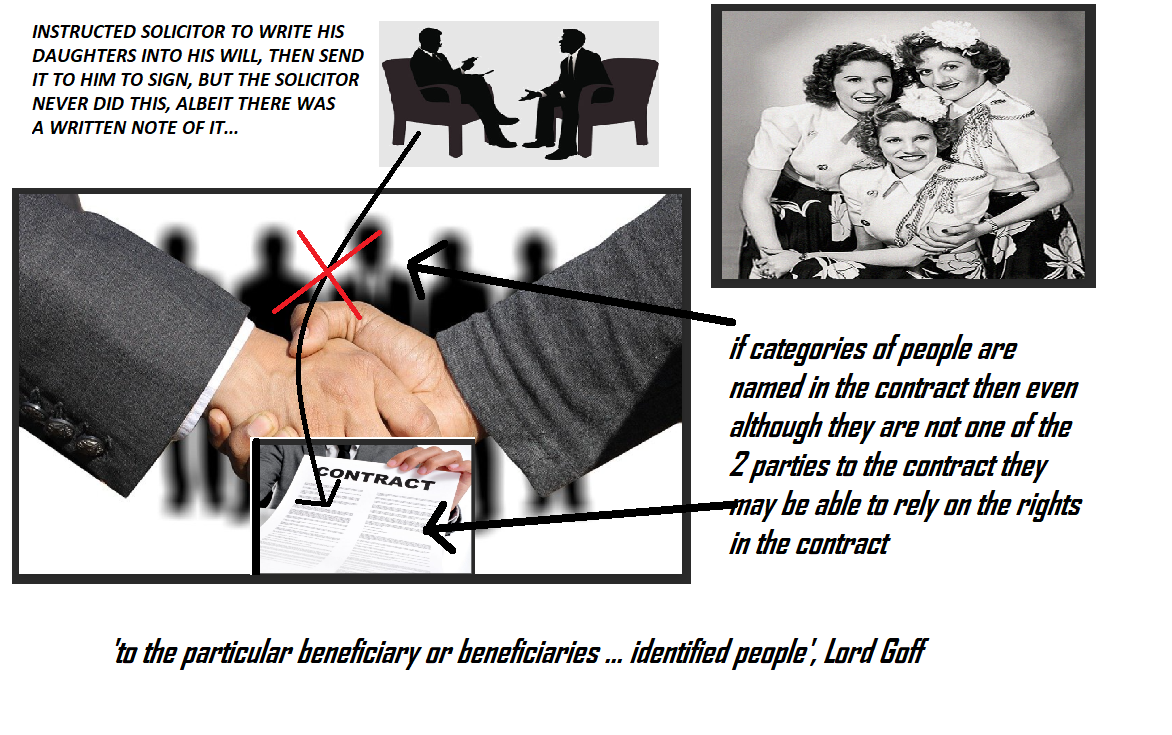White v Jones [1995] UKHL 5, 2 AC 207
Citation:White v Jones [1995] UKHL 5, 2 AC 207
Rule of thumb 1:Where an oral contract between 2 people clearly identifies another named person, and gives them rights under the contract to be completed, can this other named person can rely on the rights under the contract? Yes, and they can sue for damages caused by it.
Rule of thumb 2:IF a lawyer does not include people in a will which they were instructed to, can the lawyer themselves be sued for negligence? Yes, the lawyer is liable for the damages in these circumstances.
Background facts:
The facts of this case were that Mr White was the solicitor of Mr Barratt. Mr Jones fell out with his daughters and instructed Mr White to write a will where Mr Barratt’s daughters were all but cut out of the will. Mr Baratt’s relationship with his daughters then improved, and Mr Barratt called Mr White and asked him to rewrite his daughters back into the will – to the tune of around £9,000 being shared between them. Mr Barratt agreed a contract with Mr White for Mr White to do this for him. Mr White never got around to carrying out the contract he agreed with Mr Barratt within a reasonable period, to put these bequests for the daughters in writing so that it could be signed by Mr Barratt and relied upon by his daughters. Mr Barratt then passed away fairly suddenly, taking a heart-attack, and the will request of Mr Jones was never formally put into writing. This meant Mr Barratt's daughters never got the full money in the will which he had instructed.
Parties argued:
The executor of the will and the other family members also did not wish to give Mr Barratt’s daughters the £9,000 and so the daughters were £9,000 out of pocket. Mr Barratt's daughters, led by Mrs Jones, sued the lawyer, Mr White. Mr White argued that the contract to write Mr Jones’ daughters into the will was only between him and Mr Jones and only Mr Jones could sue him under - he argued that the privity of contracted prevents Mrs Jones and the other daughters suing him for the money. Mrs Jones argued that where people are specifically named under a contract this was an exception to the privity of contract principle.
Judgment:
The Court upheld the arguments of Mrs Jones, and held that this scenario, where people are specifically named under a contract, is indeed being one of the scenarios that are an exception to the privity of contract principle - all the Jones sisters were entitled to the £9,000. This seminal case established another exception to the principle of privity of contract. If a person is specifically named under the contract then this person can obtain rights under this contract despite not being one of the parties to it. Where there is an exception to the privity of contract principle like this it is called a jus quaesitum tertio.

Ratio-decidendi:
'There must be boundaries to the availability of a remedy in such cases; but these will have to be worked out in the future, as practical problems come before the Courts. In the present case ... liability is not to an indeterminate class, but to the particular beneficiary or beneficiaries ... the ordinary case is one in which the intended beneficiaries are a small number of identified people. If by any chance a more complicated case should arise to test the precise boundaries of the principle in cases of this kind, that problem can await solution which such a case comes forward for decision', Lord Goff
'to the particular beneficiary or beneficiaries ... identified people', Lord Goff
Warning: This is not professional legal advice. This is not professional legal education advice. Please obtain professional guidance before embarking on any legal course of action. This is just an interpretation of a Judgment by persons of legal insight & varying levels of legal specialism, experience & expertise. Please read the Judgment yourself and form your own interpretation of it with professional assistance.

